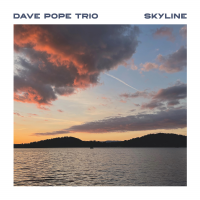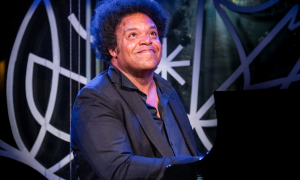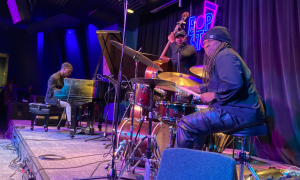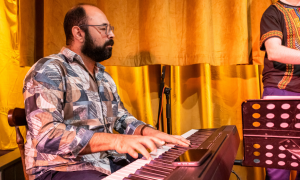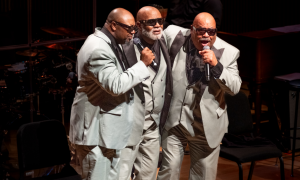Home » Jazz Articles » Live Review » 2013 Enjoy Jazz Festival
2013 Enjoy Jazz Festival

Heidelberg/Mannheim/Ludwigshafen, Germany
November 6-14, 2013
It's always a treat to return to Heidelberg for Enjoy Jazz. As a very intended contrast to most jazz festivals, that compress a lot of music into a very short time, Enjoy Jazz's founding premise, when it was first conceived 15 years ago by Festival Director Rainer Kern, was to program only one show a night, but make the festival run for 6-7 weeks, so that the amount of music actually programmed turns out the same.
It's been a winning formula, as Enjoy Jazz has grown into one of the country's largest and most respected of its kind. For six-and-a-half weeks in 2013, jazz fans from the Heidelberg/Mannheim/Ludwigshafen region (all venues no more than 20- 25 minutes drive from each other) have access to a broad cross-section of music, ranging from established artists like

Joshua Redman
saxophoneb.1969

Uri Caine
pianob.1956

Carla Bley
piano1938 - 2023

John Scofield
guitarb.1951
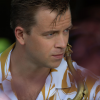
Marius Neset
saxophoneb.1985

Arun Ghosh
clarinet
Michael Wollny
pianob.1978

Brad Mehldau
pianob.1970

FLY
band / ensemble / orchestra
Larry Grenadier
bass, acousticb.1966

Mark Turner
saxophone, tenorb.1965

Peter Evans
trumpet
Chris Potter
saxophone, tenorb.1971

Nils Petter Molvaer
trumpetb.1960

Anouar Brahem
oudb.1957

Nik Bärtsch
pianob.1971

Hugh Masekela
flugelhorn1939 - 2018

Larry Willis
piano1942 - 2019
But beyond the opportunity to catch some of today's best artists in the context of one show per night, which allows for a much better opportunity to absorb the music rather than running off to the next show, after which the first show can sometimes seem a distant memory, Enjoy Jazz is, for its second year running, also making inroads into jazz education with another two-day symposium, curated by German sociologist and musicologist, Dr. Christian Broecking. How Jazz Became Art and Attack(ed): A Transatlantic Dialogue brought together a group of academics and other professionals to discuss everything from photographer Arne Reimer's series and, recently, published book—American Jazz Heroes—with the subtitle How German Journalism Pays Tribute to American Culture, to G?tz B©╣hler's flip side of the same idea, European Jazz Legends, both series originally running (European Jazz Legends still running, in fact) in the German Jazzthing magazine. Berndt Ostendorf, professor emeritus of North American Cultural History at the Amerika Institut, Ludwig-Maximilians-Universit?t M©╣nchen, spoke of growing up in the fifties and the birth of American Studies in Europe, while Canadian-born/American-resident Kurt Ellenberger (currently spending eight months in Germany) spoke of the challenges and opportunities of the digital age, and Sociology Professor at University of California Santa Cruz Herman S. Gray delivered a lecture, Jazz and Value, Jazz as Value.
When a jazz festival begins to incorporate daytime educational programming to become more than just a festival (though that can, admittedly, often be plenty good enough, as has always been the case with Enjoy Jazz), it speaks to a growing sense of responsibility for ensuring that the history of the music is carried forward. Important discussions such as these are essential as a public forum for attendees looking to expand their horizons and understanding of a music that, while acknowledged as rooted in American culture, has slowly, over the past six decades, become a truly global concern, with every culture bringing something of its own into the mix to keep the music alive and growing. It was significant, in B©╣hler's speech, when he posted a single, simple but very compelling sentence on the projection screen: "There is no such thing as European Jazz." His follow-up, which explained that each country in Europe brings something different to the evolution of jazz, was a point that should be taken seriously by those who constantly refer to "European Jazz," as if music from a collection of countries can be distilled down into a single identifiable entity. It's difficult enough, these days, to empirically define "British Jazz," "Norwegian Jazz" or "American Jazz," for that matter; and so discussions that start off using the term "European Jazz" are already in trouble.
But it's these kinds of discussions that are absolutely necessary to break down the barriers that divide a music that has always been inclusionary by nature. And between the discussions at the symposium and Enjoy Jazz's programming, it's clear that Kern and his small but extremely efficient and hospitable staff are completely aware that, rather than building walls, jazz needs to bring them down, to allow the influx of cross- cultural musical concerns into the music.
November 6, Halle02, Heidelberg: Jaga Jazzist
After last seeing Norway's impossible-to-categorize

Jaga Jazzist
band / ensemble / orchestraThe pairing—the idea of Jaga Jazzist and British radio host/journalist/curator Fiona Talkington, whose Conexions Series was, at the time, in its first season (there was a second one this year), its founding premise to bring together Norwegian and British musicians—was so successful that there have been offers of other gigs with other orchestras. Beyond that, Jaga has clearly incorporated some of the changes that working with a chamber orchestra effected on the group's music, largely written by multi-instrumentalist Lars Horntveth, one of the three siblings—also including drummer Martin and tubaist/flautist/percussionist/vocalist Line—that formed the initial core of a group that, hard to believe, given their relative youth, will be celebrating its 20th anniversary in 2014.
While there is some new material in the works, Jaga's Enjoy Jazz performance was not dissimilar to the set lists used when the group came to North American in 2012 for a tour that made a stop at the Festival International de Jazz de Montr©”al, engendering such incredible audience response that even Jaga was taken by surprise. But while many of the same tunes found their way into the Enjoy Jazz set at the funky halle02 in Heidelberg—the Phillip Glass/

Steve Reich
composer / conductorb.1936
The title track to One-Armed Bandit for example, while not including the full "Overture" found on Live With the Britten Sinfonia, did included the two- chord ostinato intro, which served as a solo spot for trombonist

Erik Johannessen
tromboneb.1975
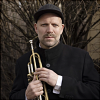
Mathias Eick
trumpetb.1979

Miles Davis
trumpet1926 - 1991

Gil Evans
composer / conductor1912 - 1988
Most surprising, however, was Lars Horntveth's length saxophone solo during the set; a multi-instrumentalist comfortable on everything from saxophones and clarinets to guitars, lap steel, vibraphone and keyboards, his role has, more often than not, been that of irrepressible texturalist, providing color and tone, melody and chordal depth. Clearly, however, he is becoming more confident as a soloist as well, and if his feature in Heidelberg is any indication, there's even better yet to come. And if there's any proof needed of his development as a composer, the nine-piece version of "Prungen"— originally debuted with Britten Sinfonia, but here interpreted with layers of synths replacing strings and horns—was perhaps even better than the orchestral version and, perhaps, a signpost of things to come when the group begins to perform new music soon for which it will soon begin to rehearse.
Meanwhile, bassist Even Ormestad, guitarist Marcus Forsgren, keyboardist ?ystein Moen, Eick (playing everything from double bass and keyboardist to vibraphone when he wasn't with his trumpet) and, in particular, multi-instrumentalist Andreas Mj?s were key players in delivering Lars Horntveth's complex charts, which skirted the edges of jazz and progressive rock without ever really being either, instead sounding like something that can only be described as: Jaga Jazzist. Beyond being its spokesperson, Martin Horntveth remained the thundering pulse of the group, a tireless drummer who combined the power of John Bonham with the finessed virtuosity (and similar power) of

Mahavishnu Orchestra
band / ensemble / orchestrab.1971

Billy Cobham
drumsb.1944
It may have been a smaller audience than Jaga normally draws, but what it lacked in size it made up for in sheer enthusiasm. It's often said that European audiences react more powerfully than North Americans (though Montr©”al crowds will give anyone a run for their money), and the small but viscerally responsive Heidelberg audience made clear that Jaga Jazzist can come back anytime. Martin Horntveth, after the show, remarked how the group had played Heidelberg before, but at the Kulturhaus Karlsorbahnhof, and that it felt much more comfortable at halle02—a venue being used by Enjoy Jazz for the first time this year, but certainly one it should continue to use in the future.
November 7, dasHaus, Ludwigshafen: John Scofield ?berjam Band
With the release of ?berjam Deux (EmArcy, 2013), guitarist John Scofield reunited his ?berjam Band of the early part of the new millennium, which released two albums- -2002's ?berjam and the following year's Up All Night (both on Verve). ?berjam was, in many ways, the culmination of Scofield's foray into the jam band territory he first explored with his superb

Medeski Martin & Wood
band / ensemble / orchestrab.1991
Scofield's abilities are, by this time, unquestionable—his career built upon an approach that combines a broader jazz vernacular with guitar sounds more typically associated with blues, soul and rock. In his early days it was simply his ability to bend a note with the complete credibility of a seasoned bluesman, combined with a very specific ability to create tension and release by moving "out" harmonically, only to rein things back in at the absolutely perfect moment. As the years have passed, Scofield has also gradually become more and more conversant with technology, bringing looping, reverse-attack, pitch shifting and more into his arsenal of sounds, in addition to a recently discovered love for Fender guitars, first adding a Stratocaster to his trusty Ibanez Artist on albums like his New Orleans-drenched Piety Street (EmArcy, 2009), but recently switching exclusively to a Telecaster for the Organic Trio tour which brought him to the Burghausen Jazz Festival earlier this year.
For his Ludwigshafen performance at dasHaus, he was again using only a Telecaster, but this time a different one that, combined with a Vox AC30 amplifier that was his own rather than rented (the norm for traveling guitarists, but Scofied keeps his own amp in Europe for bus tours), possessed as a lot more grit and grease. His ability to solo at length and increasingly employ effects with seamless ease made this ?berjam Band performance far more exciting than his 2003 set at the TD Ottawa Jazz Festival.
But it wasn't just Scofield who lit a nuclear bomb under the group at dasHaus. Bortnick, armed with a guitar, effects and Macbook, demonstrated exactly how a strong rhythm guitarist can make or break a band, and was clearly no less skilled. As the band worked its way through material largely culled from ?berjam Deux but also looking back a decade to fiery up-tempo tunes like "Snap, Crackle, Pop," from ?berjam and, from the same record, gentler tunes like Bortnick's "Tomorrow Land"—a second encore after it was clear that the sold-out house was not going to let Scofield get away with just a single encore. The group also pulled out ?berjam's "Ideofunk," with Bortnick whistling the singable melody—and, to Scofield's surprise, the audience beginning to whistle the tune, too.
Symbiotic partnerships are rare, and while Scofield has a few others in his cadre of collaborators, Bortnick is clearly one who doesn't just serve a purpose, but is as important to the sound of the ?berjam Band as Scofield, combining electronics and programmed beats with a right hand that's got to be muscular to allow him to execute some of the persistent, fast-paced rhythm playing he maintained throughout the set.
Bassist Andy Hess wasn't on the first ?berjam record, but showed up on Up All Night and became a regular band member on the road as well; a one-time member of the southern jam band Gov't Mule, his rock-steady anchor can also be heard on albums like

Michael Landau
guitarCato replaced original ?berjam drummer

Adam Deitch
drumsb.1976

Stevie Wonder
vocalsb.1950

Marcus Miller
bassb.1959
While it's not uncommon for artists to thank their audiences for a warm reception, the over-the-top enthusiasm of the dasHaus crowd in Ludwigshafen caused Scofield to remark, when he came onstage for the second encore, that this was a night the band would not soon forget. In this case, he was clearly not just saying the words, nor was he the only one; he clearly meant what he said, as the guitarist and his ?berjam Band delivered an exhilarating show that, in return, the packed Ludwigshafen venue will no doubt remember for a long time to come as well.
November 8, Alte Feuerwache Mannheim: Hugh Masekela / Larry Willis
When he played at the 2012 Cape Town Jazz Festival in Cape Town, South Africa,

Hugh Masekela
flugelhorn1939 - 2018

Larry Willis
piano1942 - 2019
The music was largely culled from the duo's recent four-CD box, Friends (House of Masekela, 2012), consisting of one group disc and three of the intimate duos that have become something of a signature for the two since they began playing together 53 years ago in New York City. Masekela described their meeting, after an elegantly funky take of

Herbie Hancock
pianob.1940
Masekela went on to describe the evening to come as "A cross-section of everything we've enjoyed over the last 53 years. Two people we loved were

Billie Holiday
vocals1915 - 1959

Clifford Brown
trumpetb.1930

Fats Waller
piano1904 - 1943
The rest of the set followed a similar format, with Masekela introducing the songs by giving a short jazz history class on everyone from

Louis Armstrong
trumpet and vocals1901 - 1971

Charlie Parker
saxophone, alto1920 - 1955
Masekela joked about his partner onstage, saying "I can't get rid of him; he calls me at 3am to play something on the piano. It's an R&B song written by Tom Bell for The Stylistics, 'You Make Me Feel Brand New.' A lot of babies were born on the heels of that song."
Masekela also talked about his own early aspirations to be a bebop player, and how everyone told him to "put some township in your music." He recalled how he'd met

Miles Davis
trumpet1926 - 1991
It was a lovely evening, with Masekela the charismatic frontman and Willis the equally important but taciturn partner who did almost all his speaking through his piano, bar a few background vocals. Both demonstrated an effortless mastery, with Masekela, in addition to switching between trumpet and flugelhorn, also bringing out a few bits of hand percussion to give some extra drive to Willis when he was soloing.
Performances don't have to be particularly striking, exciting or energetic to be memorable; some rely, instead, on warmth and intimacy. Masekela and Willis had both in spades, and their 2013 Enjoy Jazz performance was another that will not soon be forgotten.
November 10, Alte Feuerwache Mannheim: Nik B?rtsch's Ronin Rhythm Clan
Swiss pianist Nik B?rtsch is one of the few artists that Enjoy Jazz Festival Director Rainer Kern invites back almost every year. And why not? He's an artist who has carved out a very specific musical niche, one that combines hypnotic elements of minimalism with some straight-up funk grooves, something that's been called "Zen funk" and "ritual groove music." His longstanding Ronin group has gone through some significant changes in the past couple years, with original bassist Bj?rn Meyer leaving to focus more time on his own projects (in addition to Tunisian oudist

Anouar Brahem
oudb.1957

Andi Pupato
percussionWhile that track made clear that, while Ronin would be changed, it would be in good hands with Jordi, it couldn't possibly prepare anyone for B?rtsch's 2013 Enjoy Jazz performance at the Alte Feuerwache. Labelled "Nik B?rtsch's Ronin Rhythm Clan," it was a significantly expanded version of Ronin, with remaining members Sha (bass clarinet) and Kasper Rast (drums) augmented by guitarist Manuel Troller and a three- piece horn section consisting of saxophonist/flautist Fabian Capaldi, trumpter/flugelhornist Martial in-Albon and trombonist Michael Flury. If the expectation was that this would be an amped up, more muscular version of Ronin, those feelings couldn't have been more wrong...and more right.
The addition of a horn section provided B?rtsch considerably more tonal colors with which to work, while a guitarist added a combination of melodic bolstering and rhythmic chordal support as the as-ever black-robed pianist delivered a performance that built on motivic ideas both thematic and rhythmic with the rare patience he's long demonstrated. There's no immediate gratification at a Ronin (or Ronin Rhythm Clan) concert; the payoff comes over longer periods of time, as B?rtsch's music evolves slowly—though, with this expanded edition, there were some sharper than usual transitions that brought strong responses from the sold-out house.
It was great to see B?rtsch using a Fender Rhodes along with his usual grand piano; he'd not used one on record since Stoa—and that includes the two albums preceding Live, Holon (2008) and Llyr©¼a (2010)—and the added texture at the pianist's end was most welcome, as it seemed that it was often reserved for improvisational flurries within his rigorous compositional constructs that blended dense colors with plenty of space.
If anything, the addition of a horn section drew more attention to Sha, whose extended techniques, in particular his percussive popping, have never sounded better. He also acted as a second cue point for the members of the group after B?rtsch, who often signaled a change with nothing more than the exclamation of a "whoa!" or a a "hip!" Sha's cues were more visual, but it was clear just how fundamental he is to the sound of Ronin; even if his playing was often sparse, his improvisational contributions, like those of B?rtsch, tightly integrated within the compositional constructs of the pianist's "Moduls."
Rast, too, continued to prove an essential part of the Ronin sound, whether delivering relentless grooves, sharply punctuated stops and starts, or delicate but crystal clear cymbal work. This is music that demands the most pristine sound, both in the studio (which is why ECM has become such a great fit) and in concert, and it's no surprise that B?rtsch travels with his own sound engineer; it would be impossible, in the often short confines of a soundcheck, for an engineer—no matter how good he or she is—to grasp the group's sonic requirements, which transferred to stage with the same transparency of layers that it does, with ECM label head/producer
 "
data-original-title="" title="">Manfred Eicher's help, in the studio.
"
data-original-title="" title="">Manfred Eicher's help, in the studio. But the biggest surprise of the performance was Jordi. His single-track performance on Live was simply insufficient to reveal just how strong a bassist he is. While it would be unfair to compare Jordi with Meyer in terms of one being better than the other, as they are clearly both exceptionally fine electric bassists, one point of comparison surely was that Jordi demonstrated the capability of a more down-and-dirty bassist, with his tone ranging from warm and delicate to growling and visceral, in particular when Ronin Rhythm Clan was firing on all cylinders, as it did in the lengthy final piece of the evening. There's no doubt that the now-streamlined four- piece Ronin will be a very different beast indeed, not just because of the loss of Pupato but because of the addition of Jordi, a bassist who brought a far more grounded approach to the heavier, funkier aspects of the performance.
If Muscle Shoals were to move to Switzerland after a brief stopover in New York to hang with

Steve Reich
composer / conductorb.1936
November 12, Stadthalle, Heidelberg: ACS: Geri Allen / Terri Lyne Carrington / Esperanza Spalding
When last seen at the 2013 Festival International de Jazz de Montr©”al, ACS—pianist

Geri Allen
piano1957 - 2017

Terri Lyne Carrington
drumsb.1965

Esperanza Spalding
bassb.1984

Wayne Shorter
saxophone1933 - 2023

Dave Douglas
trumpetb.1963

Joe Lovano
drumsb.1952

Danilo Pérez
pianob.1966

John Patitucci
bassb.1959

Brian Blade
drumsb.1970

Weather Report
band / ensemble / orchestraDetached from the five-city Shorter celebration of the summer, it was impossible to know exactly what ACS would be up to; the only thing that was a certainty was that, with Allen gradually emerging as a pianist of significance, with the ability to move between abstract ideations and more clear lyricism at the drop of a hat, it was going to be something better than good. Spalding may be famous for her own recordings and 2011 Grammy Award win, beating out (of all people) Justin Bieber as Best New Artist and unfairly under fire from some of the jazz police, who suggested she only won because she was young and cute—both true, both irrelevant— with each passing year, she is proving herself to be a fine bassist and vocalist deserving of any accolades that come her way. Carrington has been around almost as long as Allen (about ten years younger than the pianist), but has established herself as a strong conceptualist and leader, in particular over the past couple years with albums including The Mosaic Project (Concord, 2011) and this year's re-imagining of

Duke Ellington
piano1899 - 1974

Charles Mingus
bass, acoustic1922 - 1979

Max Roach
drums1925 - 2007

Tony Williams
drums1945 - 1997
If there was any problem with ACS' show at the opulent Stadthalle in Heidelberg, it was in a mix that placed the clearly powerful Carrington far too forward, at times completely overshadowing Spalding and even, at times, Allen. In a hall the size of Stadthalle, blame the sound engineer; it's a big enough room that even if Carrington was a loud drummer, it should have been possible to balance things out in the mix that went out to the roughly 700 people in attendance. It marred the evening, making it one that should have been great but, because of the imbalance, was simply (and unfortunately) only good.
Not that this was the fault of the musicians. The focus remained on Shorter, performing many of the same tunes that they'd covered in Montr©”al, including a particularly impressive reworking of the title track to Weather Report's Mysterious Traveller (Columbia, 1974), along with a medley of "Masqualero" and "Fall" where the transition only became apparent when Spalding delivered the latter song's recognizable theme con arco. The trio also performed a version of Shorter's "Nefertiti" that was almost completely unrecognizable, as well as a more immediately recognizable take on "Virgo"; made completely their own, Shorter would, no doubt, be proud.
But while Shorter was the primary focus of the evening, ACS also included other material, including the opening

Eric Dolphy
woodwinds1928 - 1964

Nat King Cole
piano and vocals1919 - 1965
Each of ACS' members took the microphone for an introduction throughout the 100- minute set, but it was when Spalding stepped up to her microphone, not to introduce a song, but to sing a piece introduced by Allen as "Unconditional Love," but not as a tune she'd written, that her evolution became even clearer. The tune first appeared on The Mosaic Project, ACS first coming together on this one track; and while her performance on the album was good, her delivery in Heidelberg was far more impressive, as she demonstrated the ability to navigate huge intervallic leaps with absolute precision, and sing complex, rapid-fire phrases with tremendous precision. When the song was over, it was Spalding who, introducing the next song, but first mentioning Allen's humility and that the song was, indeed, the pianist's.
As much as she's evolving as a singer, Spalding is also coming along as an instrumentalist. She was already impressive nearly a decade ago, upon first encountering her at the Festival International de Jazz de Montr©”al jam sessions, where she was, at the time, playing in Joe Lovano's Us Five quintet but, at the jam, was simply swinging her ass off behind whoever was soloing. Years later, she's even more capable of collaborating on a completely equal level with older, more seasoned players like Allen and Carrington, not only grabbing a pulse and owning it, but waxing abstract when the moment called for it—and with the majority of the set dedicated to the music of Wayne Shorter, calling for it often.
First emerging as part of

Steve Coleman
saxophone, altob.1956

Dave Holland
bassb.1946

Jack DeJohnette
drumsb.1942

Marcus Belgrave
trumpet1936 - 2015

David Murray
saxophone, tenorb.1955

Charles Lloyd
saxophoneb.1938

Wallace Roney
trumpet1960 - 2020

Tineke Postma
saxophone, altob.1978

David Weiss
trumpetb.1964
While a better mix would certainly have made this a better concert, the strength, commitment and collective simpatico shared between Allen, Carrington and Spalding still managed to transcend such unfortunate technical matters. The only question, after this performance, is: when will ACS record?
November 13, Kantine Mannheimer Morgen, Mannheim: Sandi Kuhn
The cafeteria of a newspaper office may seem like an unusual place to hold a concert, but it turned out to be a surprisingly intimate and good-sounding venue for Alexander "Sandi" Kuhn, a young German saxophonist who was this year's recipient of the Jazzpreistr?ger des Landes Baden-W©╣rttemberg, an annual prize from the state of Baden-W©╣rttemberg, one of Germany's 16 states and the one in which the three locales for Enjoy Jazz—Heidelberg, Mannheim and Ludwigshafen—all reside. Mannheimer Morgen is the region's most popular daily newspaper, and so when a location was required for Kuhn's award concert, the paper volunteered its cafeteria and opening foyer for both the concert and an after-show party of drinks and pretzels (locals insisting that the pretzel was first created in Mannheim, though it's a suggestion that seems, upon further discussion and investigation, to be something up for debate).
The annual prize provides a stipend of 15,000 Euros but is, according to Kuhn after the show, more valuable for the prestige it brings and the doors it opens. A panel of ten judges nominate up-and-coming artists and, after some deliberation, arrive at a winner. Without knowing who else was in the running, the only conclusion that can be made is that Kuhn was the best of the bunch; irrespective, he certainly proved to be both a fine saxophonist and engaging writer.
Living in Stuttgart, the saxophonist, now in his early thirties, studied at both the renowned Berklee College of Music and Aaron Copland School of Music in the United States, in addition to the University of Music and Performing Arts in Stuttgart, releasing The Ambiguity of Light (JazznArts, 2013) in January of this year, the follow- up to his 2011 Personality Records debut, Being Different. The only personnel carryovers from Being Different are bassist Jens Loh and drummer Axel Pape, two fine musicians who, like Kuhn, certainly deserve broader recognition. They're also the only two members of Kuhn's band on Ambiguity to appear at his 2013 Enjoy Jazz performance; while the album features singer

Song Yi Jeon
vocalsb.1984
The replacement of guitar and vibraphone with piano meant a significant textural change to Kuhn's set, largely culled from Ambiguity though he did deliver a significantly re-imagined and re-harmonized version of

Antonio Carlos Jobim
piano1927 - 1994
Tags
Live Reviews
John Kelman
Germany
Mannheim
Joshua Redman
Uri Caine
carla bley
John Scofield
Marius Neset
Arun Ghosh
Michael Wollny
brad mehldau
FLY
Larry Grenadier
Mark Turner
Peter Evans
Chris Potter
Nils Petter Molv?r
Anouar Brahem
Nik B?rtsch
Hugh Masekela
Larry Willis
Jaga Jazzist
Steve Reich
Erik Johannessen
Mathias Eick
Miles Davis
Gil Evans
Mahavishnu Orchestra
Billy Cobham
Medeski, Martin & Wood
Avi Bortnick
Michael Landau
Adam Deitch
Stevie Wonder
Marcus Miller
Herbie Hancock
Billie Holiday
Clifford Brown
Fats Waller
Louis Armstrong
Charlie Parker
Andi Pupato
Manfred Eicher
Geri Allen
Terri Lyne Carrington
Esperanza Spalding
Wayne Shorter
Dave Douglas
joe lovano
Danilo Perez
John Patitucci
Brian Blade
Weather Report
duke ellington
Charles Mingus
Max Roach
Tony Williams
Eric Dolphy
Nat "King" Cole
Steve Coleman
Dave Holland
Jack DeJohnette
Marcus Belgrave
David Murray
charles lloyd
Wallace Roney
Tineke Postma
David Weiss
Song Yi Jeon
Julius Heise
Hubert Nuss
Antonio Carlos Jobim
Norma Winstone
Michael Brecker
Donny McCaslin
Chick Corea
Kenny Wheeler
Paul Motian
Bill Frisell
Nicolas Masson
Roberto Pianca
Emanuele Maniscalco
Comments
PREVIOUS / NEXT
Support All About Jazz
 All About Jazz has been a pillar of jazz since 1995, championing it as an art form and, more importantly, supporting the musicians who make it. Our enduring commitment has made "AAJ" one of the most culturally important websites of its kind, read by hundreds of thousands of fans, musicians and industry figures every month.
All About Jazz has been a pillar of jazz since 1995, championing it as an art form and, more importantly, supporting the musicians who make it. Our enduring commitment has made "AAJ" one of the most culturally important websites of its kind, read by hundreds of thousands of fans, musicians and industry figures every month.
Go Ad Free!
To maintain our platform while developing new means to foster jazz discovery and connectivity, we need your help. You can become a sustaining member for as little as $20 and in return, we'll immediately hide those pesky ads plus provide access to future articles for a full year. This winning combination vastly improves your AAJ experience and allow us to vigorously build on the pioneering work we first started in 1995. So enjoy an ad-free AAJ experience and help us remain a positive beacon for jazz by making a donation today.

Mannheim
Concert Guide | Venue Guide | Local Businesses
| More...
Mannheim Concerts
Sep
19
Fri
Dirik Schilgen Jazzgrooves - Jazzhaus Hd
Jazzhaus Heidelberg
Heidelberg, Germany
Sep
26
Fri

Kristin Korb Trio: Eurythmics Vs. Jazz
BIX Jazzclub
Stuttgart, Germany
Sep
28
Sun

Diana Krall
Liederhalle
Stuttgart, Germany
Sep
28
Sun

Diana Krall
Beethoven Hall (beethovensaal)
Stuttgart, Germany
Sep
29
Mon

Kristin Korb Trio: Eurythmics Vs. Jazz
Ella & Louis
Mannheim, Germany
Oct
2
Thu

Ibrahim Maalouf
Basf-feierabendhaus
Ludwigshafen am Rhein, Germany
Oct
13
Mon

Diana Krall
Alte Oper
Frankfurt am Main, Germany
Oct
17
Fri

Rachel Eckroth Trio
BIX Jazzclub
Stuttgart, Germany
Oct
18
Sat

Al Di Meola
Festspielhaus Baden-baden
Baden-Baden, Germany
Oct
25
Sat
MYT @ Deutsches Jazzfestival
Hr-sendesaal
Frankfurt am Main, Germany

Mannheim
Concert Guide | Venue Guide | Local Businesses | More...
Sep
19
Fri
Dirik Schilgen Jazzgrooves - Jazzhaus Hd
Jazzhaus HeidelbergHeidelberg, Germany
Sep
26
Fri

Kristin Korb Trio: Eurythmics Vs. Jazz
BIX JazzclubStuttgart, Germany
Sep
28
Sun

Diana Krall
LiederhalleStuttgart, Germany
Sep
28
Sun

Diana Krall
Beethoven Hall (beethovensaal)Stuttgart, Germany
Sep
29
Mon

Kristin Korb Trio: Eurythmics Vs. Jazz
Ella & LouisMannheim, Germany
Oct
2
Thu

Ibrahim Maalouf
Basf-feierabendhausLudwigshafen am Rhein, Germany
Oct
13
Mon

Diana Krall
Alte OperFrankfurt am Main, Germany
Oct
17
Fri

Rachel Eckroth Trio
BIX JazzclubStuttgart, Germany
Oct
18
Sat

Al Di Meola
Festspielhaus Baden-badenBaden-Baden, Germany
Oct
25
Sat
MYT @ Deutsches Jazzfestival
Hr-sendesaalFrankfurt am Main, Germany


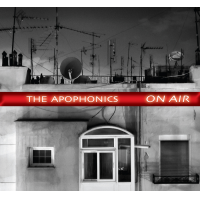


 Buy Now
Buy Now



